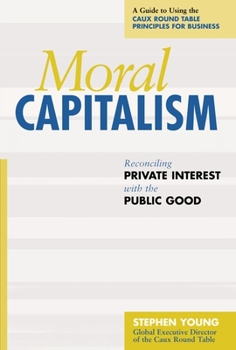Moral Capitalism: Reconciling Private Interest with the Public Good
Select Format
Select Condition 
Book Overview
"Young persuasively demonstrates the necessity for businesses to elect higher values over unbridled greed . . . a most important book." --Foreword Reviews A blueprint for global social justice is needed and this book provides one by showing that the ethical standards inherent in capitalism have been 1) compromised by cultural values inimical to capitalism's essentially egalitarian, rational spirit and 2) distorted by the short-sighted, dog-eat-dog doctrines of social Darwinism into what he calls "brute capitalism." The text presents how the Caux Round Table for Moral Capitalism's Principles for Responsible Business can serve as a blueprint for a new, more "moral capitalism" and shows how, if guided by these principles, capitalism is really the only system with the potential to reduce global poverty and tyranny and address the needs and aspirations of individuals, societies and nations.
Format:Hardcover
Language:English
ISBN:1576752577
ISBN13:9781576752579
Release Date:October 2003
Publisher:Berrett-Koehler Publishers
Length:240 Pages
Weight:1.00 lbs.
Dimensions:0.9" x 6.4" x 9.5"
Customer Reviews
4 ratings
Business Ethics is not an oxyimoron
Published by Thriftbooks.com User , 16 years ago
Excellent treatment of human behavior in ethical situations. Discusses the "origin" of ethics. Shows it is possible (and often occurs) to be ethical in a capitalist business world.
Moral Capitalism
Published by Thriftbooks.com User , 19 years ago
A book of tremendous importance. Communism committed suicide, and Capitalism needed the rescue this read can provide. Individuals, business leaders, educators, governments, economists plus some others can get extremely valuable guidelines here in how to steer the world to a safer and more enriching destiny, if they listen to the Caux Round Table's 7 principles. I have already recommended it to some important people in my reach (and beyond)
Insightful!
Published by Thriftbooks.com User , 19 years ago
The corporate scandals of recent years have led to much hand wringing about corporate values. Now comes Stephen Young, head of the Caux Round Table - an international network of executives focused on corporate responsibility - with simple rules for turning the hand wringing into action. Some of Young's advice seems to be common sense: Tell the truth, for instance, and follow the law. By encouraging capitalists to go beyond following the letter of the law, Young offers a useful guide to ethical decision making. At times, though, he seems to give capitalists a free pass. For instance, Young argues that moral capitalists have little responsibility to withhold harmful products such as cigarettes and liquor from consumers who want to buy them. We recommend this easy-to-digest study to anyone intrigued by the ethical implications of capitalism. The book is a useful presentation of the argument that capitalism, the most powerful economic system in history, must balance might and right.
Ideas, ideals, and real, useable principles
Published by Thriftbooks.com User , 21 years ago
Written by Stephen Young (the Global Executive Director of the renowned Caux Round Table, an international network of business executives), Moral Capitalism: Reconciling Private Interest With The Public Good showcases the "Caux Round Table's Seven General Principles for Business" which are the collective antidote to the destructive sides of dog-eat-dog corporate world and the crony-favoring insider deals that come with "brute capitalism" unmitigated by justice or fairness. Discussing moral capitalism as the only system that can truly counter poverty, tyranny, and the needs of individuals and nations alike, Moral Capitalism is an impressive and strongly recommended collection of ideas, ideals, and real, useable principles, as seen through the eyes of a prosperous businessman striving to balance public good with the corporate bottom line.





